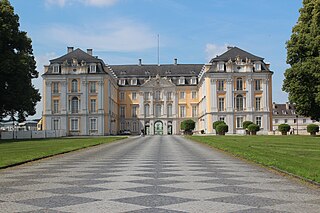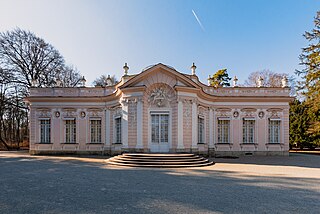Related Research Articles

Sylvie Vartan is a Bulgarian-French singer and actress. She is known as one of the most productive and tough-sounding yé-yé artists. Her performances often featured elaborate show-dance choreography, and she made many appearances on French and Italian TV.

Julie Billiart, SNDdeN was a French Catholic nun, educator, and cofounder of the Sisters of Notre Dame de Namur.
The year 1753 in architecture involved some significant events.
The year 1768 in architecture involved some significant events.

The Augustusburg and Falkenlust Palaces form a historical building complex in Brühl, North Rhine-Westphalia, Germany. The buildings are connected by the spacious gardens and trees of the Schlosspark. Built in the early 18th century, the palaces and adjoining gardens are considered masterpieces of early rococo architecture and have been listed as a UNESCO cultural World Heritage Site since 1984. Augustusburg Palace and its parks also serve as a venue for the Brühl Palace Concerts.

The Nymphenburg Palace is a Baroque palace situated in Munich's western district Neuhausen-Nymphenburg, in Bavaria, southern Germany. The Nymphenburg served as the main summer residence for the former rulers of Bavaria of the House of Wittelsbach. Combined with the adjacent Nymphenburg Palace Park it constitutes one of the premier royal palaces of Europe. Its frontal width of 632 m (2,073 ft) even surpasses Versailles.

Maximilian III Joseph, also known by his epithet "the much beloved" was a Prince-elector of the Holy Roman Empire and Duke of Bavaria from 1745 to 1777. He was the last of the Bavarian branch of the House of Wittelsbach and because of his death, the War of Bavarian Succession broke out.

The Residenz in central Munich is the former royal palace of the Wittelsbach monarchs of Bavaria. The Residenz is the largest city palace in Germany and is today open to visitors for its architecture, room decorations, and displays from the former royal collections.

The Theatine Church of St. Cajetan and Adelaide is a Catholic church in Munich, southern Germany. Built from 1663 to 1690, it was founded by Elector Ferdinand Maria and his wife, Henriette Adelaide of Savoy, as a gesture of thanks for the birth of the long-awaited heir to the Bavarian crown, Prince Max Emanuel, in 1662. Now administered by the Dominican Friars, it is also known as the Dominican Priory of St. Cajetan.

Giovanni Battista Ferrandini, an Italian composer of the Baroque and Classical eras, was born in Venice, Italy and died in Munich, at the age of about 81.

The Cuvilliés Theatre or Old Residence Theatre is the former court theatre of the Residenz in Munich, Bavaria, Germany.

The Munich Opera Festival takes place yearly in the Bavarian capital from late June to late July. Preceding on the calendar the two nearby festivals of Bayreuth and Salzburg, which both start in late July, the festival summarizes the concluding main season's work of the Bavarian State Opera, which administers it, and offers premieres of new stage productions by the company, Germany's largest.
François de Cuvilliés, sometimes referred to as the Elder, was a Spanish Netherlands-born Bavarian decorative designer and architect. He was instrumental in bringing the Rococo style to the Wittelsbach court at Munich and to Central Europe in general.

The Amalienburg is an elaborate hunting lodge on the grounds of the Nymphenburg Palace Park, Munich, in southern Germany. It was designed by François de Cuvilliés in Rococo style and constructed between 1734 and 1739 for Elector Karl Albrecht and later Holy Roman Emperor Charles VII and his wife, Maria Amalia of Austria.

Cuvilly is a commune in the Oise department in northern France.
The Bavarian Film Awards have been awarded annually since 1979 by the state government of Bavaria in Germany for "exceptional achievement in German filmmaking." Along with the German Film Awards, these are the most highly regarded awards for filmmaking achievement in Germany.

Dieter Dorn is a German theatre director, also for the opera, the manager of the Münchner Kammerspiele from 1983 to 2001 and now manager of the Bavarian Staatsschauspiel.
Sylvie Brunet is a French politician of the Democratic Movement (MoDem) who was elected as a Member of the European Parliament in 2019.

Sylvie Laufeydottir is a fictional character portrayed by Sophia Di Martino in the Marvel Cinematic Universe (MCU) media franchise, partially based on the characters Lady Loki and Sylvie Lushton's Enchantress from the Marvel Comics. She is an alternate version of Loki who helps him fight to overthrow the Time Variance Authority (TVA). She hopes to destroy the TVA and He Who Remains for stealing away her life, viewing herself as an agent of the universe itself. She is later forced to ally with a variant of Loki from 2012.

François de Cuvilliés the Younger was a German architect, engraver, draftsman, engineer, and author. He was the son of François de Cuvilliés.